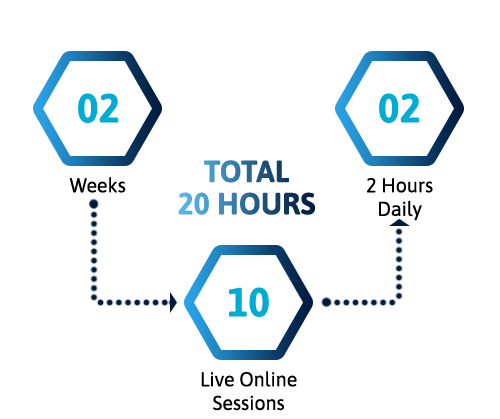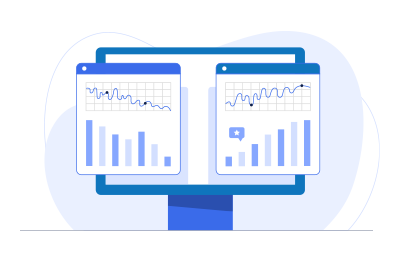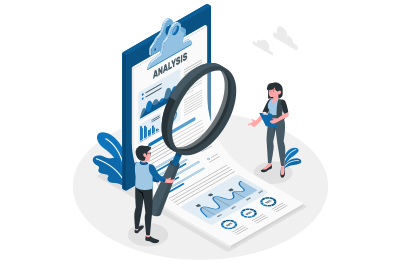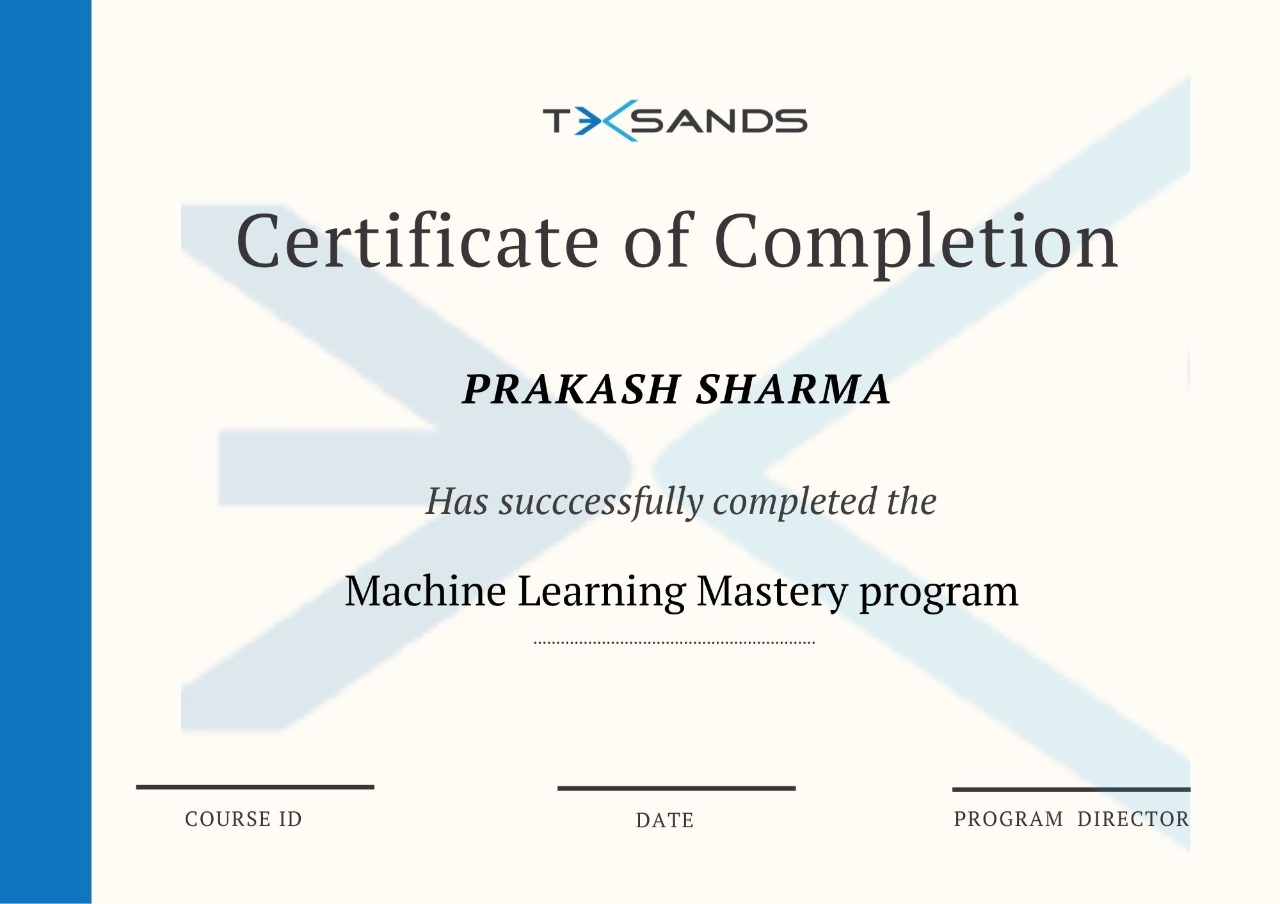Real Life Use Cases
Types of Learning Algorithms
Measuring Model Accuracy
Using Hyperparameters to Optimise Model Performance


10 x 2 Hours LIVE Instructor-led Sessions

7 Modules

All Sessions Recorded Videos available

5 Projects

Quizzes & Assessment

Instructor Support through learners forum

Additional Resources

Certificate
This course spans 2 weeks, 10 LIVE online sessions of 2 hours each, totaling 20 hours.
In this course, you will learn the basics of Python Language, a total of five Machine Learning Techniques such as Linear Regression, Logistic Regression, Support Vector Machines, Decision Tree and Random Forest for solving a variety of problem types. There will also be five projects that will be demonstrated and five projects given as assignments to consolidate your learning.
Teksands High Impact Series is designed specifically for the busy professionals who would want to develop the maximum understanding on the topics in the shortest time possible. This course uses a completely practical based approach to run through as much as projects/code/demo as possible and explain both the concepts and coding/solutions parts on the go with the demo. The learners are then given additional projects as practice assignments for them to solve them on their own and solidify their understandings.

This LIVE course, Machine Learning Mastery will provide 20 hours of intense LIVE Training to the Learners.

Introduction to Python

Introduction to Machine Learning

Linear Regression with Demo & Assignment

Logistic Regression with Demo & Assignment

Support Vector Machines with Demo & Assignment

Decision Tree with Assignment

Random Forest with Assignment

Model Selection Methods
Real Life Use Cases
Types of Learning Algorithms
Measuring Model Accuracy
Using Hyperparameters to Optimise Model Performance

Example
Car Price or House Price prediction given historical transaction data. You will learn how the Linear Regression algorithm learns patterns and helps predict new Car or House price based on parameters given.

Example
Predict which customers are likely to leave the current provider based on their behavioural data from past. We will look at a Telecom or Insurance industry case study.

Example
We will look at images handwritten digits and determine which image belongs to which digit by using classification techniques.

Example
We will look at how in Netflix recommends the best possible movies to your liking based on viewing habits of yours and viewers of similar profiles.

Example
We will learn how to use NLP (Natural Language Processing Methods to determine a sentiment score for online product reviews.
| Start Date | Schedule | Timings | |
|---|---|---|---|
| 18th Oct | Mon-Fri (10 weekdays) | 7 - 9 am | Request Brochure/ Register for Demo Class |
| 15th Nov | Mon-Fri (10 weekdays) | 7 - 9 am | Request Brochure/ Register for Demo Class |
Course Fee: INR 3850 (INR 8200)
Data Science and Predictive Analytics has served a multitude of functions and job needs and a lot of Job Roles are created in organizations in the last few years. Some of the prominent Job Roles in this space are listed below:
Data Scientist: Data Scientists would have the responsibility of understanding and analysing all the data the organisation has and create Data Driven products and solutions to create businesses processes more efficient, drive automation, create decision systems, future prediction systems, etc.
Data Architect: Data Architects would typically analyse the organisational Data Schemas, design new schemas for newer data driven systems , tune existing data schemas, optimise organisational Mete Data and all data repositories including ETL Systems.
Data and Analytics Manager: Responsible for managing and leading Data initiatives in the organisation, including leadership in ETL programs, Decision Systems programs, leading analytics teams, etc.
Data Analyst:Data Analysts typically gather and analyse data within divisions and organisation for the purpose of building Insights and Analytics solutions and systems using a range of tools, techniques including statistics. This role is highly important for the leadership of any organisation to develop understanding of business trends.
Machine Learning Engineer: Responsible for developing sophisticated Machine Learning Models that are to create various Decision, Prediction, Classification, Clustering systems on Business Data. All the roles above and the plethora of roles this space is offering are growing rapidly in demand and skills shortfall is even expanding leading to high salaries for every skilled personnel in these fields.
Given "Data is the new Fuel", demand for professionals in these fields in the many years to come will continue to expand unabated creating massive opportunities for data professionals.
With Data Science applications booming through businesses leading to saving costs, better profitability and driving newer business models and products, the demand for these skills have skyrocketed. Literally, every business today is after quality skilled professionals in Data Science and Analytics. Not only they are looking for Data Science and Predictive Analytics skills to create new solutions, but preferring these as must-have skills in all other fields to drive continuous automation and efficiency. Even Business and Operations personnel are today are equipping themselves with foundational knowledge in these areas to save costs through automation.
Some statistics:
The course is completely based on practical approaches of teaching. Learners will have intense exposure to real code and data while learning the concepts on the go. We will also provide you all the codes used in training and also additional problems for you to work on and practice.
The Delivery method is Online, Live Classes led by Professional, Industry Experienced Instructors.
20 Hours
Weekday Courses: Over 2 Weeks, all Weekdays (Monday to Friday), 2 hour Sessions per day.
Weekend Courses: Over 3 Weekends, Saturdays and Sundays, 3.5 hour Sessions per day.
(Please check your specific course schedule)
All courses on Teksands are taught by Industry Professionals, highly qualified and focused Research Scholars from Reputed University
Upon successful completion of the programme, participants will be awarded a verified digital certificate by Teksands.


"Teksands' mission is to have Future ready Technology workforce. We provide Online and Corporate Courses on Deep Tech including Data Science, Machine Learning, Artificial Intelligence, Python, Deep Learning, Neural Network, and much more. Teksands courses are intended to primarily help working professionals achieve career augmentation or career switch in Deep Tech areas by delivering very high quality, application driven training suited to the needs of our learners needs and goals. "Teksands High Impact Series" & "TEKS - RISE" are the flagship programs to offer short term & longer duration Career Oriented courses."